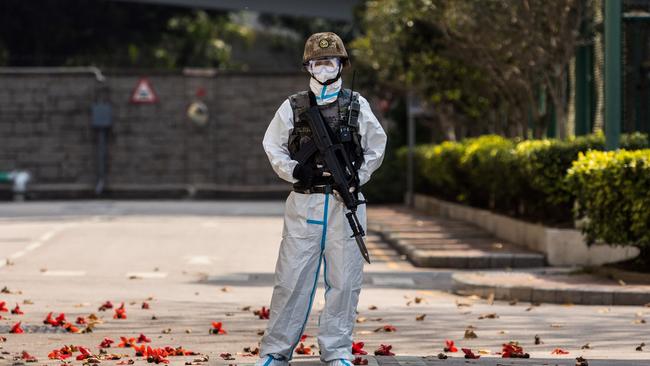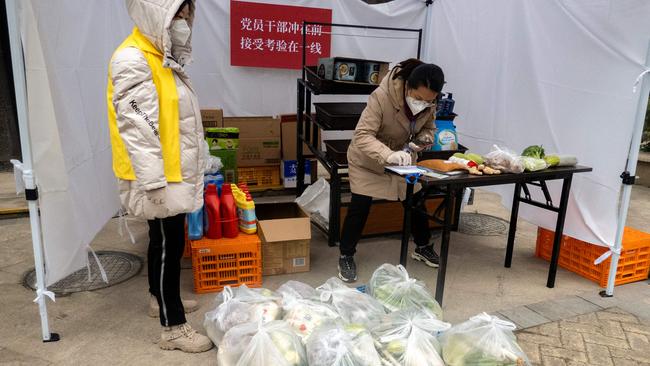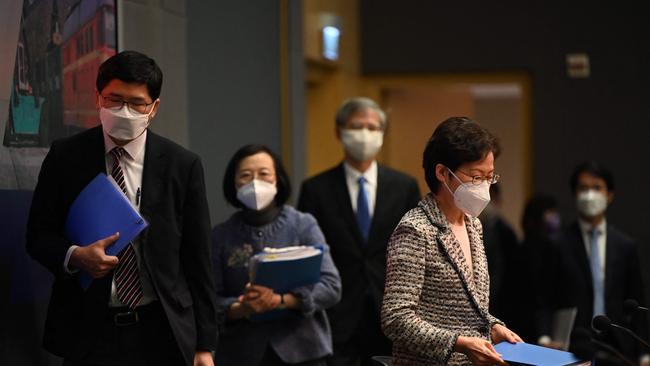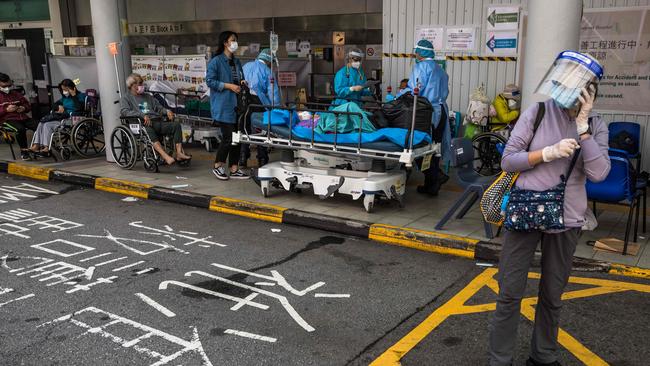Grim future for ‘zero-Covid’ Hong Kong decimated by virus
The light at the end of the tunnel for Hong Kongers may be very far away as an expert presages extensive restrictions

World
Don't miss out on the headlines from World. Followed categories will be added to My News.
Hong Kong could be forced into a lockdown with compulsory universal testing as it continues to hold onto its ‘dynamic zero Covid’ strategy despite having the world’s highest death rate from the virus.
A leading health expert has warned that under China’s dynamic zero Covid policy, Hong Kongers are likely to be subject to extensive measures even after the current wave subsides.
“In some ways, one of the most troubling aspects of this is that what we’re seeing now is just a short term thing. Even once this wave subsides, this is not the end of dynamic zero Covid in Hong Kong,” said Associate Professor Karen Grépin at the University of Hong Kong’s school of public health.
Hong Kong is currently experiencing the highest rate of Covid deaths per capita in the world. It has seen 3535 deaths in the last two weeks. In the last week, Hong Kong has averaged 37.87 daily deaths per million, above Mauritius at 23.56, Norway at 16.28, Bermuda at 16.11, and Finland at 11.54.
Health experts say that Hong Kong’s high rate of deaths is driven by the city’s low vaccination rate among the elderly and lack of hospital capacity.
Government data show that only 35 per cent of people aged over 80 and 65 per cent of people aged between 70 and 79 have received two doses of any Covid-19 vaccine.
Hong Kong’s current Covid policy setting is one of ‘dynamic zero’ as demanded by the mainland Chinese government.
China has remained stubborn in its dedication to its policy of suppressing Covid-19 as much as possible. Under its dynamic zero policy, small outbreaks are quelled quickly with localised lockdowns, travel restrictions, and mass testing.
When Xi’an, a city of over 12 million people, was locked down before the Beijing Winter Olympics, residents in some areas were not allowed out of their homes even to go to the shops and instead had to depend on patchy government distribution of food.

The Chinese government has not given any indication that it would rethink this policy – instead, it has doubled down, imposing a lockdown on Shenzhen’s 12 million residents two days ago.
Hong Kong, having come under tighter control of China since its massive pro-democracy protests three years ago, is likely to have to maintain this policy.
Associate Professor Alfred Wu of the National University of Singapore’s Lee Kuan Yew school of public policy told the South China Morning Post that Beijing would be eager to demonstrate that its methods can contain the virus.
“The Chinese government has treated all these fights against Covid-19 as a kind of political achievement. Political achievement means a political show. So if the situation looks severe, but finally they are able to crack down, to some extent, it actually boosts China’s image”.
The city’s chief executive admitted to reporters last month that dynamic zero was a “requirement of the mainland”.

Nonetheless, for the time being, Hong Kong is buckling under the world’s highest rate of Covid deaths per capita.
“There’s no doubt that what we’re experiencing right now in Hong Kong is a direct result of low uptake of vaccines among the elderly,” said Dr Grépin.
Vaccine hesitancy has been fostered by a mix of politicisation and misinformation. At the start of Hong Kong’s rollout, both the Chinese-produced SinoVac and the European-produced Pfizer vaccines were available. The SinoVac vaccine did not come with results from clinical studies the way the Pfizer vaccine did and thus produced room for confusion.
The Economist reported in April last year that despite the SinoVac vaccine not being backed up with phase 3 clinical trials and showing lower efficacy rates, Chinese and Hong Kong officials, in a show of national pride, incentivised residents to get this vaccine instead of Pfizer’s.
“The politicians have all got Sinovac and the medical experts have got BioNTech: what does that tell you?” a medical scientist told The Economist.

In the daylight between scientific fact and the practicalities of everyday life chiselled open by politicisation and a lack of information, Dr Grépin said that misinformation and fear permeated especially among people with health issues.
“And so there were a lot of news articles upfront that suggested that there were side effects associated with taking vaccines and it scared a lot of people.
“[The government] recommended that you speak to your doctor. This created an idea that you had to be healthy in order to get vaccinated – otherwise, why would you speak to your doctor?
“I think many of the physicians were poorly incentivised to provide the right information and were very risk averse and worried about the repercussions associated and provided poor advice.”
As a result, many of the elderly who naturally have more comorbidities and health problems chose not to get the vaccine, fearing some kind of adverse reaction.
Similarly to Australia, “if you’re in a situation like we were towards most of last year in which there was no Covid in Hong Kong, any risk from vaccination could be seen as worse than the risk of getting Covid because there was no risk of getting Covid in the short term,” she said.
This is further compounded by the fact that the SinoVac vaccine provides “little immune protection” from the effects of the Omicron strain.
More Coverage
Originally published as Grim future for ‘zero-Covid’ Hong Kong decimated by virus




